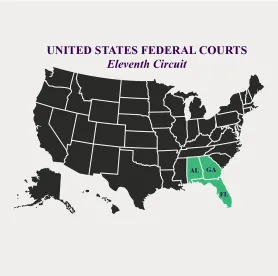On October 14, 2020, the Florida Fourth District Court of Appeal granted a petition for a writ of certiorari quashing a trial court’s discovery order that had compelled an employer to produce “financial worth” discovery in an employment discrimination case. While the trial court retained broad discretion over the scope of discovery, the appellate court held that the employee lacked an evidentiary basis to substantiate the need for financial worth discovery. Moreover, the appellate court suggested that statutory caps on punitive damage awards may be considered in determining the appropriate scope of financial worth discovery.
Background
Cheryl Ohel filed suit against Vital Pharmaceuticals, Inc., alleging unlawful employment discrimination in violation of the Florida Civil Rights Act (FCRA). Ohel later served a request for production of documents asking for information relating to Vital’s net worth, ostensibly to assess a value for punitive damages. Vital objected to the requests because there had been no determination regarding “a reasonable evidentiary basis” for punitive damages, and because the FCRA capped punitive damages awards at $100,000. Vital reasoned it could stipulate to its ability to pay $100,000, but any further intrusion into its financial affairs was unwarranted.
Ohel moved to compel discovery of Vital’s financial information, arguing that the damages cap should not be considered because a jury does not know about the cap when considering an award. Ohel argued that Vital’s financial worth was needed to assess the reasonableness of the amount.
In response, Vital reiterated its position, emphasizing the damages cap and noting that the requested financial discovery constituted an “‘unfettered fishing expedition.’” Vital further noted that “[n]o depositions had been taken,” nor was there any other discovery indicating that punitive damages were likely to be awarded.
The trial court ruled in favor of Ohel, reasoning that the FCRA allowed a claim for punitive damages “without inquiry into its evidentiary basis.” Vital’s petition for certiorari relief followed.
The Appeal
At the outset, the appellate court acknowledged the broad discretion afforded to trial courts on discovery issues and Vital’s “heavy burden in a certiorari proceeding,” which requires a showing that the trial court’s order “departs from the essential requirements of law.” The appellate court held that Vital had met that burden here, in part.
The appellate court reviewed Section 768.72 of the Florida Statutes, which was enacted to “resolve the problem of litigants using punitive damage claims to obtain pre-judgment financial worth discovery.” Relying on prior decisions, the appellate court noted that this type of discovery is not permitted “until the trial judge determines there is a valid claim for punitive damages to use as the predicate for such discovery.”
The court of appeals also reviewed the punitive damages statute, which states in Fla. Stat. § 768.72(1), “No discovery of financial worth shall proceed until after the pleading concerning punitive damages is permitted.” Finally, the appellate court reviewed the FCRA, which exempts discrimination claims from the requirements outlined in the punitive damages statute. In other words, punitive damages claims are permitted at the outset of FCRA employment discrimination cases, as is financial worth discovery related to those claims.
Relying on Tennant v. Charlton, 377 So. 2d 1169 (Fla. 1979), the appellate court noted that while financial discovery may be permitted, a trial court is still required to protect a party from overly burdensome and harassing discovery. The appellate court reasoned that in conjunction with this duty, “[a] trial court may consider whether there is an actual factual basis to support a punitive damage claim when deciding whether to limit, deny, or delay discovery.”
Here, the appellate court found that the trial court had “fail[ed] to recognize its duty and ability under Tennant to protect a litigant from intrusive financial worth discovery when there is no actual factual basis for recovery of punitive damages.” Accordingly, the appellate court found that the trial court had “departed from the essential requirements of [the] law” and that Vital’s petition on this issue should be granted.
Vital also advanced arguments regarding the specific scope of the discovery sought, arguing that it was harassing and unduly burdensome. The majority concluded that while there should certainly be limitations to curb abusive discovery practices, those limitations should be evaluated on a case-by-case basis by trial courts.
Key Takeaways
First, while a plaintiff remains entitled to seek financial worth discovery in Florida employment discrimination cases, the trial court still has an affirmative duty to limit that discovery, particularly when a factual basis does not exist to support a punitive damage claim. Second, while the appellate court did not expressly set parameters on scope, it suggested that broad categories of financial documents should not be discoverable when an employer is clearly solvent and capable of paying the maximum punitive damage award.





 />i
/>i

